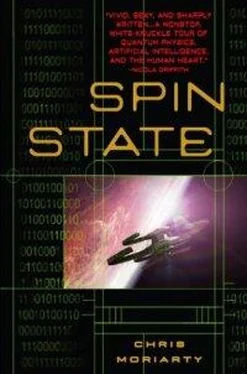“Not in any way you’re likely to be very enthusiastic about, I’m afraid.” Cohen tapped up the scale on the area of the plans that included the lab spoke. “Physically, I have no idea where the intraface is. All I do know is that it’s in this lab. Unfortunately, the lab files—personnel, inventory, everything—are deadwalled.”
“Like Metz.”
“Worse than Metz.” He looked up at her. “Alba has a weapons-grade semisentient.”
A chill worked its way down Li’s spine and settled in her stomach. She hated logging on to semisentients. Her fear was unreasonable—or so she had tried many times to convince herself. Sometimes she wondered if it was just blind prejudice; the one time she’d mentioned it to Cohen, he’d gotten so offended it had taken weeks to smooth his ruffled feelings.
But still.
There was something sharklike about the big semisentients: brute computing power, unfettered by hard programming or by the all-too-human qualms and foibles of fully sentient Emergents. Logging on to a semisentient was like swimming in dark bottomless water. Impossible to believe that the wordless menace that lurked behind their numbers could become Cohen. Terrifying to think that Cohen was only a few operations, a few algorithms removed from them—and that no one could say for certain where to draw the line between the two.
“So how do we get you in?” Li asked.
Cohen raised an eyebrow. “You assume a lot. I haven’t agreed to help you yet.”
“What do you want me to do, say pretty please?”
“You’re magnificent. Why is it that the bigger the favor you’re asking for, the more unpleasant you become?”
“You’ll get paid,” Li said. “Last time I checked, that makes it a job, not a favor.”
Cohen lit a cigarette without offering Li one and set the case and lighter on the table, carefully aligning them with the gold-leafed corner scroll.
“I think we’ll just let that one slide, shall we?” he said. “Unless you actually want to pick a fight with me?”
Li kept silent.
“Right then. The lab AI has disabled external communications. You can’t call in. You can’t get wireless access. All you can do is call out to approved numbers, and you can only do that by direct contact jack.” He smiled and tapped the ash off the end of his cigarette with a Byzantine flourish. “Which means, my dear, that you’re going under the knife.”
Li fingered her temple, where she could just feel the flat disk of the remote commsystem transmitter under her skin. She’d never gotten a direct-contact wire-to-wire jack. She’d never had to. Those were reserved for techs, like Kolodny, the people who did the real grunt work of cracking target systems—and who ran risks from which the automatic cutouts of Li’s remote interface largely protected her.
“You come up with that idea yourself?” she asked Cohen. “Or did you get help from Korchow?”
“I wouldn’t waste my time arguing about it if I were you,” Cohen said. He shot a dark stare at her over the top of his wineglass. “A jack is nothing compared to what they’re going to need to do to you to get the intraface working.”
Li bit her lip and shifted uncomfortably as her thoughts roved from semisentients to contact jacks to the several hundred meters of prototype hardware Sharifi had been carrying around in her head when she died. How had they slid into actually planning this mission without any discussion of whether or not Li was going to let Korchow test-run the intraface on her?
Had she actually made that decision herself? Or had Cohen coaxed her into it like a chess master nudging his player across the board toward the enemy? Was Nguyen right about him? And even if she wasn’t, even if his intentions were good, what did he really want from her?
“Has anyone actually tested this intraface thing?” she asked, settling on an easy, emotionally neutral question.
“I think there’s a monkey somewhere who has one.”
“Oh.” Li laughed nervously. “How’s he doing?”
“He’s crazy.”
“Cohen!”
“But there’s some indication that he was crazy to begin with. And besides, he’s a monkey.”
He pointed to the network of alleys and firewalls around the lab’s back entrance. “Right. Here’s my first brilliant idea. We do a cutout around this door that would get you past the security network.”
“Which means you have to be on-station to fiddle the main AI. Which means a second person for you to shunt through. Which means twice as much chance of getting caught.”
The more they worked through it, the shorter the list of realistic options got. Cracking Alba was like building a house of cards; each piece of the puzzle that fell into place exposed another piece, another problem, another collapse waiting to happen.
They went at it again, teasing out the problems and pitfalls until they had something that looked like a plan in front of them. At least as far as getting through the security checks and actually retrieving the data went.
But they were still left with the problem of how to get Li into Alba undetected.
“Hang on,” Li said finally, grabbing at the fleeting tail of what looked like it might just be a viable option. “Go back to that first section we looked at. Hydroponics.”
Cohen tapped back through half a dozen screens to reach it.
“What about these turrets?” She pointed to a row of ten-meter-high towers jutting through the thick pelt of guy wires, sensor lenses, and communications equipment that bristled from the outer skin of the station. “They look like vents.”
“Sure.” A look crossed Chiara’s smooth face that made Li think Cohen knew exactly where she was going with this. “Decontamination vents for the algae flats. So what?”
“So the last time I was on Alba, it was overcrowded.”
“It always is.”
“Well, what’s the daily CO 2load?”
Cohen paused for a moment, searching. “Sixty thousand cubic meters. And, to anticipate your next question, they’re shipping in about 1.8 thousand of compressed oxygen every day.”
“So where’s the excess CO 2going?”
“Out those turret vents, obviously.”
“Where it can get out, I can get in.”
“Not without someone inside to open the vents.”
“Korchow says he’s got an inside man.”
“Not possible,” Cohen said, scanning the plans again. “They’re using the outgoing CO 2to turn the turbines that power this whole section of the solar array. And even if you get past the turbines, you’re still talking about crawling down a twenty-meter shaft in hard vacuum. And the vent diameter’s too small to take a suit and gear.” He tapped decisively on the tight print that gave the duct’s dimensions. “You can’t get in that way.”
“I could if I stashed my gear outside and went down the duct with just a pressure suit.”
“Too risky. You’re talking about crawling down an active ventilation duct in hard vacuum with no air, no heat, just a pressure suit. If anything goes wrong—even if you just run into a minor delay—you’re dead.”
Li smiled. “And you won’t have anyone to eat oysters with.”
The look Cohen gave her couldn’t have been more naked if he’d stripped his skin away. She saw fear, guilt, anger flash across his face. Then she looked away; whatever else was there, she couldn’t deal with it. Not now, anyway. She pushed her beer away from her. It left a ring on the table, but for once Cohen didn’t seem to care about the punishment her bad habits were inflicting on his furniture.
“What if I say I won’t do it?” he asked.
“We go forward with another AI,” she said, pushing down the thought that it might not be true.
“You’d be insane to try it without me.”
Читать дальше












